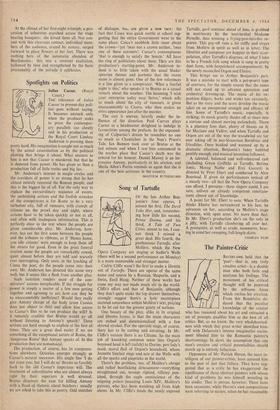Song of Tartuffe
Cedric Cliffe wasn't the first to make a libretto out of Tartuffe. There are operas of the same name and source by a Russian, Shaporin, and a Swiss, Emil Haug. Neither of these works has come my way nor made much stir in the world. Cliffe's effort and that of Benjamin, although they don't quite make the 'top drawer themselves, strongly suggest there's a lyric masterpiece secreted somewhere within Moliere's text, praying to be let out for the greater gaiety of nations.
One beauty of the play, alike in its original and libretto forms, is that the main characters are etched and dimensionalised with a few shrewd strokes. For the operatic stage, of course, there has to be cutting and corseting. In Mr. Cliffe's version there is no CMante. So the main job of knocking common sense into Orgon's bemused head is left (safely) to Dorine, pert lady's maid, moral flail of Orgon's household, whom Jeanette Sinclair sings and acts at the Wells with all the sparks and pinpricks in the world.
There's the problem, too, of Moliere's abrupt and rather bootlicking denouement—everything straightened out, wrongs righted, villainy pun- ished, through the eagle omniscience of the reigning prince (meaning Louis XIV, Moliere's patron), who has been watching all from high above. In Mr. Cliffe's finale the newly exposed Tartuffe, gaol sentence ahead of him, is grabbed in matrimony by the matriarchal Madame Pernelle, thus winning a frying-pan-into-fire re- prieve. This pay-off runs a bit stiffly and strays from Moliere in spirit as well as in letter. The librettist and composer are happier in their inter- polation, after Tartuffe's disgrace, of what 1 take to'be a French folk song which is sung in pretty duet form, with harpsichord accompaniment, by the newly reconciled Orgon and Elmire.
This brings me to Arthur Benjamin's part. It was a mistake to start with a pot-pourri type of overture, for the simple reason that the tunes will not stand up to advance quotation and orchestral dressing-up. The music of his ex- position fidgets, barks and winks too anxiously. But as the story and the score develop the music takes on an unexpected strength and efficacy of line. Some of Tartuffe's music, especially, is striking; its mock gravity shades off at times into a curious and almost moving melancholy. There is a plummy love duet, plenty of bloom on it, for Mariane and Valere; and when Tartuffe and Orgon are out of the way the woodwind are for ever taking off in neo-Straussian floridities and frivolities. Once hooked and warmed up by a dramatic situation, Benjamin's fancy bubbled prettily enough, and musical invention followed.
A talented, balanced and well-rehearsed cast (including Gwyn Griffiths as Tartuffe, Bettina Jonic, Morag Noble and Erci Garrett) is directed by Peter Ebert and conducted by Alan Boustead. If given six performances instead of a measly two—all that the New Opera Company can afford, I presume—these singers could, I am sure, enliven an already competent entertain- ment almost out of knowledge.
A point for Mr. Ebert to note. When Tartuffe thinks Elmire has surrendered to his lust, he advances on her, according to Moliere's stage direction, with open arms. No more than that. In Mr. Ebert's production she's on the sofa in a jiffy, with Tartuffe clambering all over her. A premature, as well as crude, manoeuvre, bear- ing in mind her sweeping, full-length skirts.
CHARLES REID


































 Previous page
Previous page